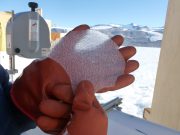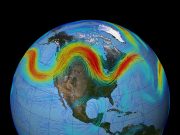Why do whales migrate? They return to the tropics to shed their skin, scientists...
Whales undertake some of the longest migrations on earth, often swimming many thousands of miles, over many months, to breed in the tropics. The...
Fossilized wing gives clues about Labrador’s biodiversity during the Cretaceous
A fossilised insect wing discovered in an abandoned mine in Labrador has led palaeontologists from McGill University and the University of Gda?sk to identify...
Brain cells protect muscles from wasting away
While many of us worry about proteins aggregating in our brains as we age and potentially causing Alzheimer's disease or other types of neurodegeneration,...
Researchers develop high-capacity EV battery materials that double driving range
Dr. Hun-Gi Jung and his research team at the Center for Energy Storage Research of the Korea Institute of Science and Technology (KIST, President...
A plan to save Earth’s oceans
At least 26 per cent of our oceans need urgent conservation attention to preserve Earth's marine biodiversity, a University of Queensland-led international study has...
Frozen bird turns out to be 46,000-year-old horned lark
Scientists have recovered DNA from a well-preserved horned lark found in Siberian permafrost. The results can contribute to explaining the evolution of sub species,...
XMM-Newton reveals giant flare from a tiny star
A star of about eight percent the Sun's mass has been caught emitting an enormous 'super flare' of X-rays—a dramatic high-energy eruption that poses...
We must prioritize the protection of ecosystems
Prioritising and tracking the protection of countries' ecosystems—from wetlands to reefs, forests and more—is critical to protecting Earth's biodiversity.
That's the plea from The University...
Old carbon reservoirs unlikely to cause massive greenhouse gas release
Permafrost in the soil and methane hydrates deep in the ocean are large reservoirs of ancient carbon. As soil and ocean temperatures rise, the...
What if we could teach photons to behave like electrons?
To develop futuristic technologies like quantum computers, scientists will need to find ways to control photons, the basic particles of light, just as precisely...
Jet stream not getting ‘wavier’ despite Arctic warming
Rapid Arctic warming has not led to a "wavier" jet stream around the mid-latitudes in recent decades, pioneering new research has shown.
Scientists from the...















